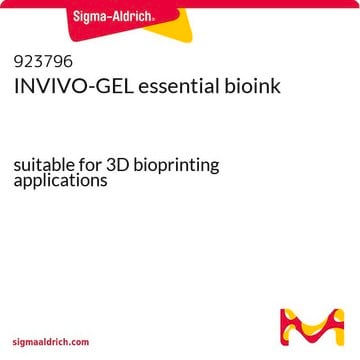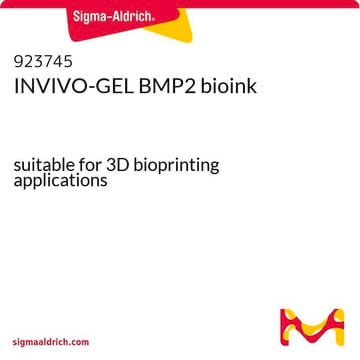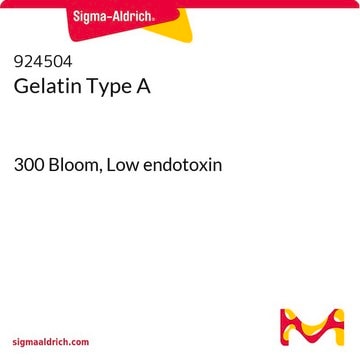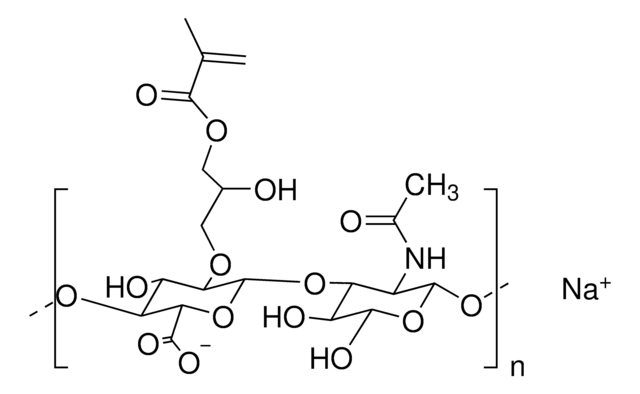Összes fotó(1)
Fontos dokumentumok
915211
Lifeink® 240
acidic type I collagen bioink, 35 mg/mL
Szinonimák:
3D Bioprinting, Bioink, Collagen
Bejelentkezésa Szervezeti és Szerződéses árazás megtekintéséhez
Összes fotó(1)
About This Item
UNSPSC kód:
12352201
NACRES:
NA.23
Javasolt termékek
Minőségi szint
sterilitás
sterile; sterile-filtered
form
viscous liquid
koncentráció
30-40 mg/mL (Collagen concentration)
35 mg/mL
szennyeződések
≤10 EU/mL Endotoxin
szín
colorless
pH
3.0-5.0
tárolási hőmérséklet
2-8°C
Alkalmazás
Lifeink® 240 is a collagen based bioink that is suitable for 3D bioprinting using the FRESH printing technique. The recommended printing temperature is at 2-25 °C. It is a an acidic Type I collagen bioink at a concentration of 35 mg/ml. Lifeink® 240 is formulated in an acidic saline buffer solution. Once the collagen is printed into LifeSupport™, the pH and salts concentration of the printed structure become physiological. Cells can then be seeded onto the printed structure allowing for cell adherence and cellular remodeling of the 3D bioprinted structure. This bioink possesses high print fidelity, shear-thinning, strong mechanical strength, and good cytocompatibility.
Jogi információk
LifeSupport is a trademark of Advanced BioMatrix, Inc.
Lifeink is a registered trademark of Advanced BioMatrix, Inc.
Figyelmeztetés
Warning
Figyelmeztető mondatok
Óvintézkedésre vonatkozó mondatok
Veszélyességi osztályok
Met. Corr. 1
Tárolási osztály kódja
8A - Combustible corrosive hazardous materials
WGK
WGK 1
Válasszon a legfrissebb verziók közül:
Analitikai tanúsítványok (COA)
Lot/Batch Number
Nem találja a megfelelő verziót?
Ha egy adott verzióra van szüksége, a tétel- vagy cikkszám alapján rákereshet egy adott tanúsítványra.
Már rendelkezik ezzel a termékkel?
Az Ön által nemrégiben megvásárolt termékekre vonatkozó dokumentumokat a Dokumentumtárban találja.
In vivo remodeling of a 3D-Bioprinted tissue engineered heart valve scaffold.
Maxson E L, et al.
Bioprinting, 16, e00059-e00059 (2019)
S Fox et al.
Biomedical materials (Bristol, England), 14(4), 041001-041001 (2019-02-23)
Human autologous bioengineered skin has been successfully developed and used to treat skin injuries in a growing number of cases. In current clinical studies, the biomaterial used is fabricated via plastic compression of collagen hydrogel to increase the density and
G Filardo et al.
Bone & joint research, 8(2), 101-106 (2019-03-28)
Meniscal injuries are often associated with an active lifestyle. The damage of meniscal tissue puts young patients at higher risk of undergoing meniscal surgery and, therefore, at higher risk of osteoarthritis. In this study, we undertook proof-of-concept research to develop
A Lee et al.
Science (New York, N.Y.), 365(6452), 482-487 (2019-08-03)
Collagen is the primary component of the extracellular matrix in the human body. It has proved challenging to fabricate collagen scaffolds capable of replicating the structure and function of tissues and organs. We present a method to 3D-bioprint collagen using
Tudóscsoportunk valamennyi kutatási területen rendelkezik tapasztalattal, beleértve az élettudományt, az anyagtudományt, a kémiai szintézist, a kromatográfiát, az analitikát és még sok más területet.
Lépjen kapcsolatba a szaktanácsadással









